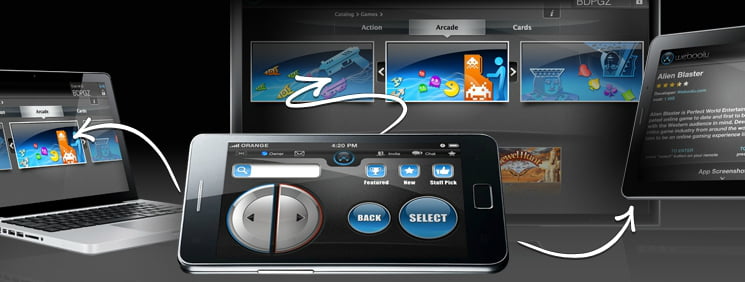As cloud computing and mobile gaming keep advancing, it was only a matter of time until the two would be combined to offer a gaming experience accessible anywhere. Israeli startup Weboolu is offering just that – a system that allows you to play video games anywhere, by using a browser as the game’s screen and a smartphone as a controller – without the need of buying a gaming console.
Weboolu is a cross-platform gaming startup. Its main target: casual gamers, or in other words, people who enjoy idly throw angry birds at pigs while on the bus or casually playing games with friends without having to put an end to conversations.
The founders, Itay Gur (CEO) and Gur Zeevi (VP of Business Development) founded Weboolu in February 2011, and have since presented it at a few key conferences worldwide. They aim to offer gamers the ability to play their games on any screen, and offer gamers the option of starting a game on one screen and continuing the same game at a later time on a different screen.
Related articles
- GreenRoad: The App That Uses Your Smartphone To Make Driving Safer
- RAY: The Israeli Smartphone For The Visually-Impaired
The smartphone as a gamepad
Weebolu was one of 15 Israeli startups presented during the Microsoft Think Next 2012 event in Tel Aviv. It was described by the company as the world’s first game console based on HTML5 and cloud technology. According to the founders, the advantage of Weboolu over other videogame platforms such as PlayStation or Xbox is that it doesn’t require you to buy a physical console and a TV to plug it into.
The game’s screen is, simply, your Internet browser; the controller – your smartphone. The browser can be accessed on computers, but also via tablet, smartphone, smart TV, etc.
The problem smartphone application developers deal with isn’t only designing the game, but also deciding how to adapt the user’s interactivity to the shape of a mobile device which is not designed solely for gaming. Although over the years they have been coming up with new solutions such as dragging objects like the slingshot in Angry Birds or simulating a slicing motion like the swiping finger-gesture in Fruit Ninja, at the end of the day, for old school gamers there is still nothing like firmly gripping and flicking their thumbs over a good old joystick-studded two-hand controller. Weboolu swerves around this problem by bringing these two worlds crashing together: smartphone games meeting the world of videogame consoles.
Sign up for our free weekly newsletter
SubscribeThe browser as a screen
On their Website, Weboolu’s cross-platform integrating nature is described as its ability to “integrate with any device that has browser capabilities, thus instantly transforming it into a gaming console.” This feature enables the user to play any Weboolu game either on their computer, their smartphone, their tablet or their smart TV, all of which allow access to internet browsers. For now, though, Weboolu is only supported by two browsers: Chrome or Safari, the upside of this selection being that it can be enjoyed by both PC and Mac users.
Subsequently, the possibilities ramify. Smartphone owners will be able to continue their saved games in places previously unthought-of, such as cybercafés, shopping centers or hotels. It also offers multiplayer experiences, in which many users can interact on one same screen.
But the interactivity experience does not end there. Their websites currently offers a WDN (Weboolu Development Network), an online environment in which anyone can test and create new games using Weboolu technology. Their API was open to the public for the first time during the latest AT&T Hackathon, in July 2012.
All in all, the gaming world is just as alive and changing, as is the world of startups. Weebolu is the proof of it. Founded in February 2011, it has slowly but steadily made itself a name on the net and in the world of entrepreneurism, making it into conferences as big as Casual Connect in Seattle or the aforementioned Microsoft Think Next in Tel Aviv. Although still in its beta testing stage, the creators are eager to launch their platform as soon as possible.
Photo by Weebolu
Related posts

Editors’ & Readers’ Choice: 10 Favorite NoCamels Articles

Forward Facing: What Does The Future Hold For Israeli High-Tech?

Impact Innovation: Israeli Startups That Could Shape Our Future




Facebook comments